International Women's Day: Roxie Nafousi tries posting 'less-than-perfect' images
- Published

Blogger and model Roxie Nafousi has 46,000 followers but says her moments of anxiety and depression are exacerbated by the pressure to look perfect on social media. In the run-up to International Women's Day we asked her to experiment by posting less-than-perfect moments from her life. She explains why she found it almost impossible.
The idea was to post things that aren't quite as glamorous, things that just generally go wrong in your day. I thought, "Definitely, that's going to be fine." But I quickly realised that I didn't feel comfortable posting mundane, ordinary moments on Instagram. I realised that social media is a form of escapism. You don't want to be seeing someone do their tax return, for example, because you're so bored of doing it yourself.
And I didn't want to post something negative because that makes me seem weak, vulnerable, mentally unstable. Not the person I want to project. You have this image of who you want to be on social media. And usually that's someone confident with a good life that's really happy, that's having fun, because everybody else seems to be like that on Instagram.
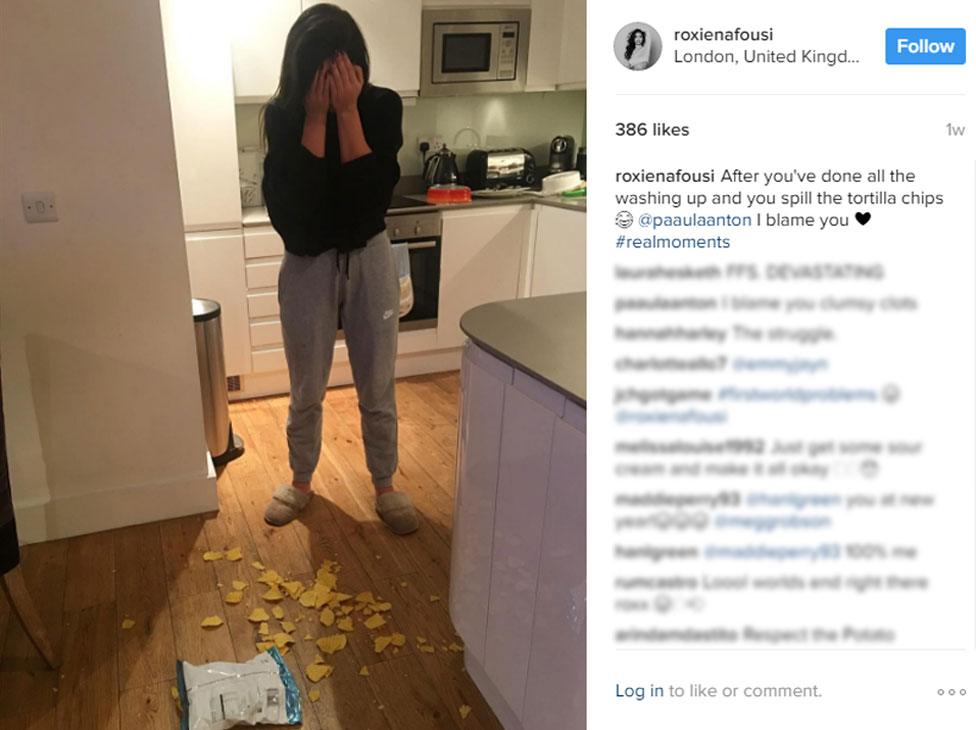
She managed to share one less-than-perfect image
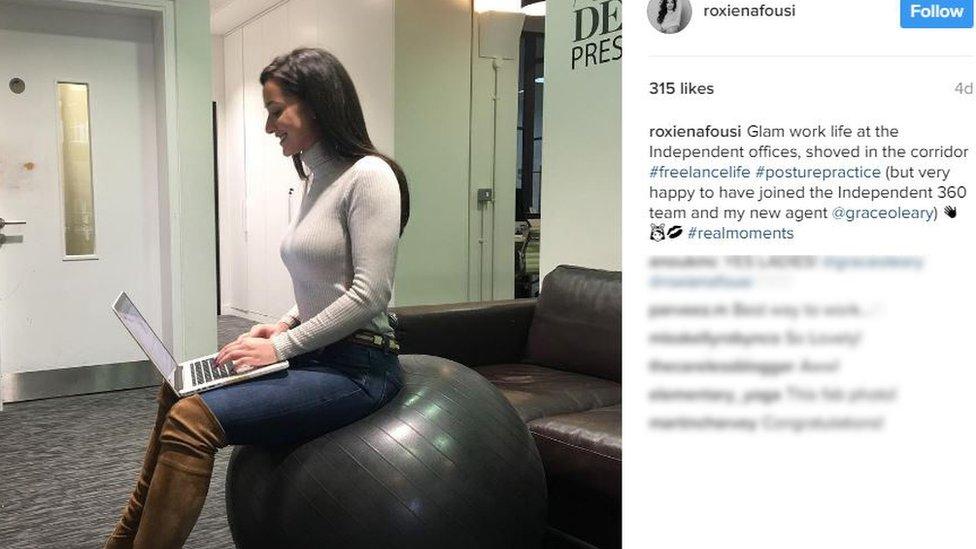
... but most of the photos she felt were mundane contained a certain glamour - whether working on her laptop...
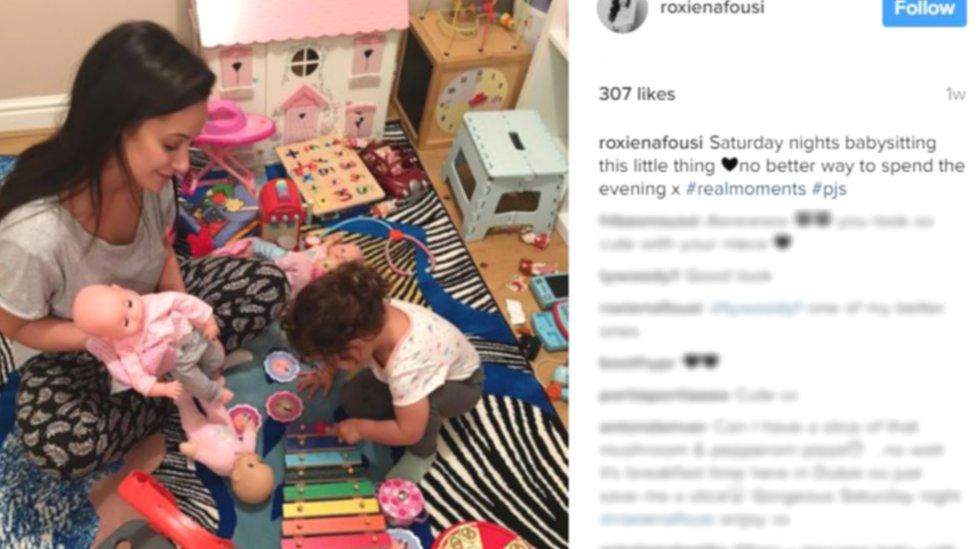
... or babysitting her niece in her pyjamas...
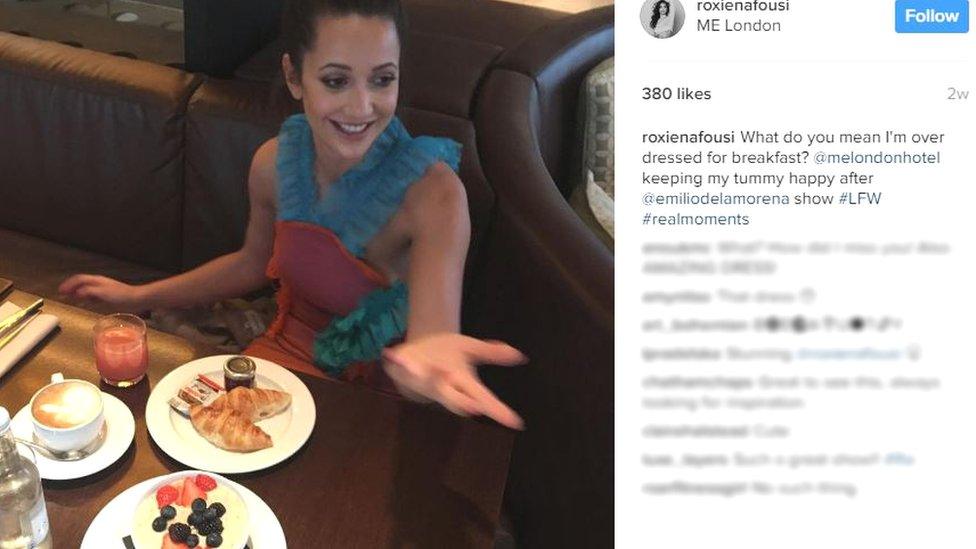
... or just eating breakfast
When we scroll through our feed we want to see something that's either aspirational or motivating. We go on Instagram to escape from our problems or worries and to upload the best parts of our lives so that when we look back on our feed we think, "Wow, what a great few months I've had." I guess it's like looking back at our own gratitude list and I love social media for that, for allowing us to curate a feed of positive moments in our lives.

More stories for International Women's Day

One photo I uploaded during the experiment was one of me with my niece in her playroom, and another was me working on my laptop. I felt uncomfortable doing it because to me I thought, "This is such a boring picture, why would anyone want to see this?" It really emphasised just how much we think about people's opinions when uploading things to our feed.

This is how Roxie would usually present herself at London Fashion Week....

... but this time she admitted feeling tired: "I was definitely having a total confidence failure over fashion week, I was suffering from a bad flu so I felt really run down."
I have a real love-hate relationship with social media. While I love it for the motivational and aspirational things that I see, it can equally exacerbate feelings of insecurity and anxiousness. I can often come off Instagram feeling quite low. It's like this addiction when you post a picture, because you want the likes to give you that "high" but then you're always left looking at your feed with a sense of "oh well I'm not having as much fun as that".
It's that "compare and despair" attitude, as Fearne Cotton has phrased it. I think people have always done this, even before social media. Before digital cameras you would invite your neighbours round and show them your photo album from your holiday, or you'd perfect your front garden to have the best roses in the neighbourhood. Now you just post another picture to Facebook.

The type of aspirational photos Roxie usually has on her feed
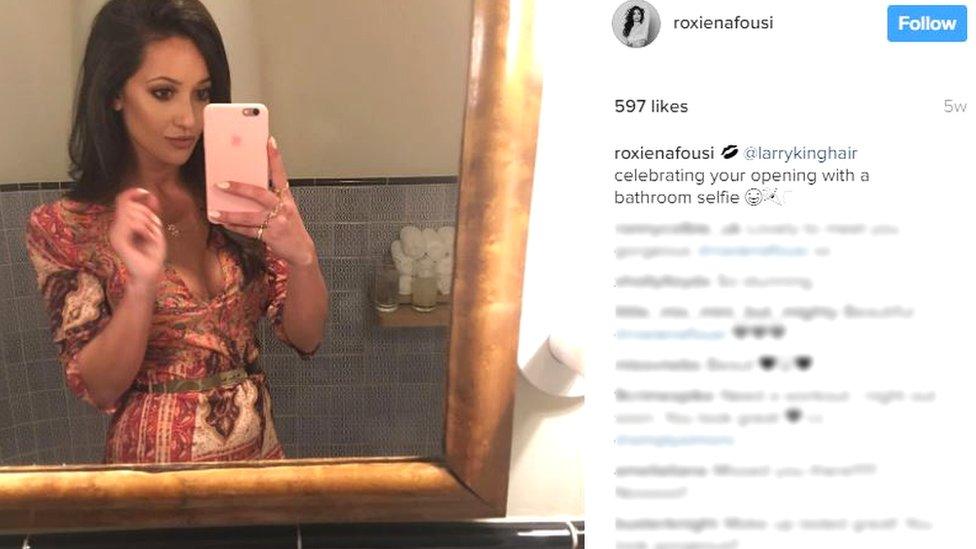
This isn't always a negative thing though, it's nice to feel proud of ourselves and our achievements. It's just that now it's so global and so constant.
Particularly for young people, when we have an exciting moment in our lives the first thing that comes into our heads is: "I have to Instagram this!" which is crazy because what are we doing it for? Does a good moment not count unless it's documented for the world to see? Is it because we want to feel good about ourselves? Is it because we want other people to think highly of us?
If I post a picture in which I think I look nice what do I really think is going to happen? Is someone going to suddenly think, "I really like Roxie, she must be such a nice person because she looks nice in her selfie?" No, of course not! And yet we still put so much emphasis on the likes to give us self-assurance. It's a dangerous game we play here because it can really damage our self-esteem when we don't need to allow it to.

The link between social media and mental health
A recent NHS survey found that 26% of women aged 16-24 reported symptoms of mental health symptoms such as anxiety and depression, making them the group with the highest risk for mental health problems, and three times more likely to report such symptoms than men.
Stephen Buckley from the mental health charity Mind says self-esteem issues can be a "gateway" to mental health problems, as we compare our real lives to our friends' "curated versions" of their lives. He has the following tips:
Be aware that what you are reading will have an impact on you.
If you are looking at airbrushed edits of models be aware that this isn't what they really look like.
Take a break.
If something's winding you up, step away.
Charge your phone overnight in a different room, so you get enough sleep
If you are affected by any of the issues in this article you can contact Samaritans on 116 123 or jo@samaritans.org

I do suffer from a lot of bad days and a lot of self-esteem issues so I'm really trying to monitor my attitude towards social media so I don't let it get me down but instead use it for all its positive aspects.
Instagram's not going to go away, social media's not going to go away, the way we use it is probably not going to change any time soon. I think what's important is to control the amount we use it and changing the way that we view it. I think this experiment has really proved to me the extent to which everybody is curating their own lives. I don't think it's the root of problems but I think it exacerbates the insecurities that young people have.
Being a teenager is so hard anyway, imagine doing it now with social media!


What is 100 women?
BBC 100 Women names 100 influential and inspirational women around the world every year. We create documentaries, features and interviews about their lives, giving more space for stories that put women at the centre.
Follow BBC 100 Women on Instagram, external and Facebook , externaland join the conversation.

I am an ambassador for the Mental Health Foundation. One way they are helping educate young people is to get year-12s to talk to year-eights about mental health. As a kid it's very hard to understand what emotions you're going through. It's not that either you're depressed or you're not. Mental health is on a spectrum - we all sit on there somewhere. I think the way to really help young people cope with modern pressures is to give them the mental strength and confidence to be their own person and to understand what's behind social media and to understand the process of it.
As a community, we can help people around us to feel less alone and stronger in themselves.
But I must admit I am happiest when I'm on holiday with my family, and I just put my phone down for a week.